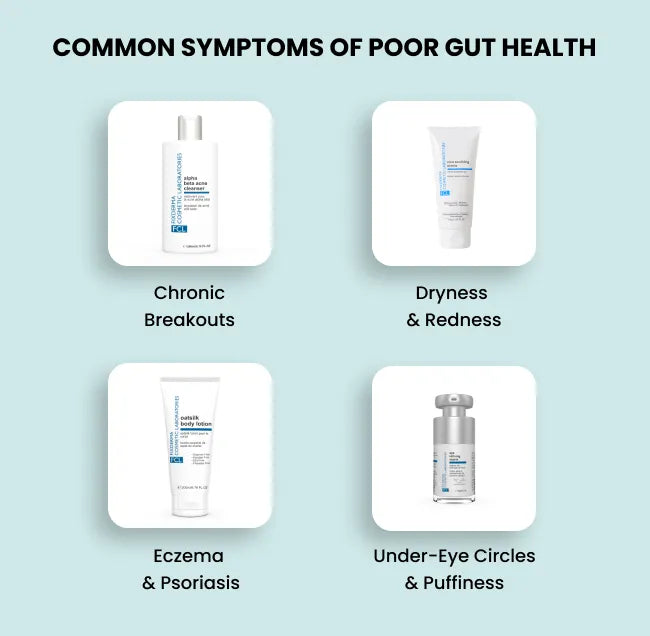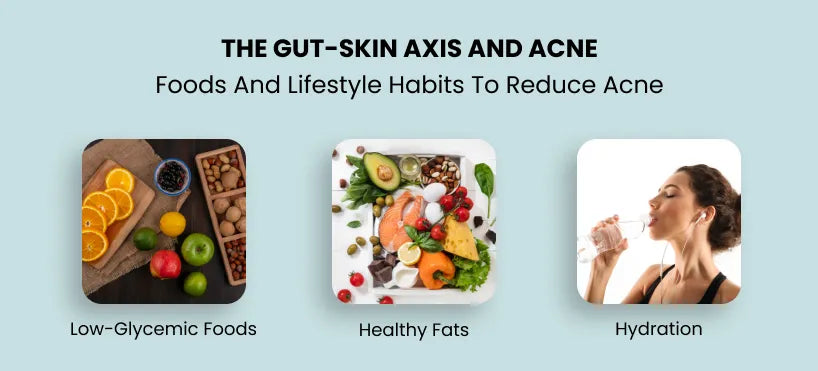
Gut-Skin Connection: How Does Your Digestive Health Impact Your Skin?
By: Sandip KumarTables of Content
- Understanding the Gut-Skin Axis
- How Gut Health Affects Skin Health
- Common Symptoms of Poor Gut Health
- Diet and the Gut-Skin Connection
- The Gut-Skin Axis and Acne
- Building a Gut-Friendly Skincare Routine
- Probiotics, Prebiotics, and the Gut-Skin Relationship
- The Gut-Brain-Skin Connection
- Key Takeaways: Balanced Gut Leads To Healthy & Glowing Skin
- Frequently Asked Questions (FAQs)
The relationship between our digestive system and skin health has gained immense attention recently. Often referred to as the gut-skin connection, this link suggests that issues in our digestive system can directly impact skin health and appearance. The gut, our body's complex ecosystem of bacteria and other microorganisms, has far-reaching effects beyond digestion, influencing immunity, inflammation, and hormonal balance.
For those struggling with persistent skin problems—like acne, eczema, or psoriasis—understanding how digestive health impacts the skin could be the missing piece. In this blog, we’ll explore the science behind the gut-skin connection and share practical tips for maintaining both gut and skin health.
Understanding the Gut-Skin Axis
The gut-skin axis is a complex communication network connecting the gut and the skin. The gut houses trillions of microorganisms, collectively known as the gut microbiome, which plays a critical role in digestion, nutrient absorption, and immune function. When this microbiome becomes imbalanced—an issue known as dysbiosis—it can disrupt other bodily systems, including the skin.
This gut-skin communication primarily occurs through inflammation. A healthy gut keeps inflammation under control; however, an imbalanced gut releases inflammatory molecules that travel throughout the body, impacting skin health and potentially triggering skin conditions.
Research shows that maintaining a healthy gut microbiome through diet, lifestyle, and supplements can significantly improve skin issues by reducing systemic inflammation. By nurturing a healthy gut for glowing skin, you can create a supportive environment that benefits your overall complexion and clarity.
How Gut Health Affects Skin Health?

The gut influences skin health through several key mechanisms, each of which underscores how digestive health and skin are intertwined:
- Inflammation Control: When the gut microbiome is imbalanced, it can lead to chronic inflammation, which is known to worsen acne, eczema, rosacea, and psoriasis. A balanced gut helps control this inflammation, promoting clearer, calmer skin.
- Nutrient Absorption: The gut is responsible for absorbing vital nutrients that the skin needs, such as Vitamins A, C, and E, zinc, and omega-3 fatty acids. These nutrients are essential for skin repair, hydration, and resilience. Poor gut health compromises nutrient absorption, which can lead to skin that looks dull or dry.
- Hormonal Regulation: The gut microbiome plays a role in hormonal regulation, including stress hormones and sex hormones like estrogen and testosterone. Hormonal imbalances are a known trigger for acne, especially in adults. Balancing gut health may help regulate these hormones and reduce hormonal acne.
- Immune System Support: Around 70% of the body’s immune cells are located in the gut. When the gut is healthy, it supports a strong immune response that can defend against bacteria and pathogens that may cause skin infections and breakouts.
Through these pathways, it’s evident that gut health directly contributes to a clear, glowing complexion, making gut health for clear skin an important factor in any holistic skincare routine.
Common Symptoms of Poor Gut Health

Sometimes, skin symptoms can be a sign that your gut needs attention. Here are signs of poor gut health on the skin to watch for:
-
Chronic Breakouts: Acne, especially in areas around the chin, jawline, and cheeks, could be a sign of hormonal and digestive imbalances.
Expert Recommendations: FCL Alpha Beta Acne Gel helps to exfoliate dead skin cells and unclogs the skin pores. By regulating skin oil production, it helps prevent new acne breakouts. -
Dryness and Redness: Skin that is constantly dry, red, or flaky may indicate that the body isn’t absorbing essential nutrients due to poor digestion.
Expert Recommendations: FCL Cica Soothing Cream is infused with madecassoside, renowned for its soothing properties. This cream is designed to calm, hydrate, and heal sensitive, irritated, or damaged skin. -
Eczema and Psoriasis: These inflammatory skin conditions are often linked to inflammation in the gut.
Expert Recommendations: FCL Oatsilk Body Lotion is formulated with the Triple Oat Complex, Shea butter Linolenic acid & Sodium PCA to relieve and soothe skin while moisturizing for 24 hours to provide lasting protection and skin hydration. -
Under-Eye Circles and Puffiness: When the gut struggles to filter toxins, it can affect circulation, leading to dark circles and puffiness around the eyes.
Expert Recommendations: FCL Eye Refining Matrix is a perfect solution to all problems affecting the skin around the eyes. It is a blend of proven effective ingredients that works as protective, moisturizers, antioxidants, whiteners, and skin-firming agents.
If you experience any of these issues, addressing gut health may help reduce skin problems and restore a more vibrant, even complexion.
Diet and the Gut-Skin Connection

The food you eat has a direct effect on your gut and skin. Studies have shown that a high-sugar, high-fat, and low-fiber diet can lead to gut imbalances, which then manifest as skin issues. Let’s take a look at foods for gut-skin health that can nourish both your gut and your complexion.
Foods that Promote Gut and Skin Health
- Fiber-Rich Foods: Foods like fruits, vegetables, whole grains, and legumes are high in fiber, which feeds the good bacteria in your gut. This helps reduce inflammation, which in turn reduces skin inflammation and can promote a clearer complexion.
- Probiotic-Rich Foods: Fermented foods like yogurt, kefir, kimchi, and sauerkraut contain probiotics—good bacteria that support gut health. These beneficial bacteria contribute to gut health and skin benefits by enhancing immunity, reducing inflammation, and promoting skin hydration.
- Antioxidant-Rich Foods: Berries, leafy greens, and brightly colored vegetables contain antioxidants, which help fight oxidative stress and reduce inflammation. Antioxidants protect the skin from damage and promote a healthy glow.
- Omega-3 Rich Foods: Fatty fish, flaxseeds, and chia seeds are high in omega-3 fatty acids, which are known to reduce inflammation and improve skin hydration.
- Prebiotic Foods: Foods like garlic, onions, leeks, and asparagus are rich in prebiotics, which act as food for the probiotics in your gut. A diet that includes prebiotic foods helps maintain a balanced gut microbiome.
By incorporating these foods into your diet, you’re supporting both gut health and skin resilience. A diet that prioritizes gut health for clear skin can also promote overall wellness.
The Gut-Skin Axis and Acne
Acne is a common skin issue that is often influenced by gut health. The relationship between gut health and acne is complex, but research indicates that gut imbalances can lead to hormonal fluctuations and inflammation, both of which contribute to acne formation.
Foods and Lifestyle Habits to Reduce Acne

To address acne, focus on foods that support gut health for reducing acne. These include:
- Low-Glycemic Foods: High-glycemic foods (such as sugar and refined carbs) spike blood sugar levels, leading to insulin production and increased oil production in the skin. Choose whole grains, vegetables, and lean proteins to help maintain balanced blood sugar levels.
- Healthy Fats: Avoid processed and fried foods, which can disrupt the gut. Instead, choose healthy fats like avocados, nuts, and olive oil, which support gut and skin health.
- Hydration: Staying hydrated helps flush out toxins and supports digestion, promoting a clear, glowing complexion.
Lifestyle changes, such as stress management and adequate sleep, also contribute to a balanced gut microbiome and help reduce acne.
Building a Gut-Friendly Skincare Routine

A gut health skincare routine combines internal and external approaches for optimal results. While diet and lifestyle are essential, skincare products that support the skin’s natural microbiome can enhance the effects of a gut-friendly diet.
Recommended Skincare Ingredients
-
Probiotic and Prebiotic Skincare: Skincare products containing probiotics (like Lactobacillus) and prebiotics (such as inulin) can help balance the skin’s microbiome, reduce inflammation, and promote resilience against environmental stressors.
Product Recommendations: FCL Pre+Probiotic body lotion offers natural healthy skin nutrition with probiotics as a skin superfood. Probiotic skin nutrition helps restore the skin barrier and locks the moisture while acting as a protector. -
Gentle Cleansers: Avoid cleansers with harsh chemicals, as they can strip the skin’s natural oils. Gentle, pH-balanced cleansers help maintain the skin’s microbiome and barrier.
Product Recommendations: FCL "C" Scape Cleanser is formulated to be as effective, but gentler, causing less disruption to the skin barrier and minimal change to skin pH. The mild face wash removes dead skin cells, oil, dirt, and other types of pollutants from the skin, helping to keep pores clear and prevent skin conditions such as fine lines, pigmentation, and acne. -
Antioxidants: Topical antioxidants like vitamins C and E protect the skin from environmental damage, supporting skin clarity and radiance.
Product Recommendations: FCL C Scape 25 Serum is an advanced antioxidant treatment designed to optimize collagen production and address common signs of aging such as fine lines, wrinkles, and dark spots. - Moisturizers with Ceramides: Ceramides strengthen the skin’s barrier, helping it retain moisture and ward off irritants.
By using products that complement your gut health efforts, you’re giving your skin the best chance to heal, repair, and glow.
Probiotics, Prebiotics, and the Gut-Skin Relationship
The roles of probiotics for skin health and prebiotics are significant. Probiotics, which are beneficial bacteria, help maintain a balanced gut microbiome and reduce inflammation. They can be taken as supplements or through diet. Prebiotics, on the other hand, are dietary fibers that feed these good bacteria, supporting their growth.
Benefits of Probiotics and Prebiotics for Skin

- Reduced Inflammation: Probiotics and prebiotics can help control inflammation, which is beneficial for acne, eczema, and other inflammatory skin conditions.
- Improved Skin Barrier Function: A healthy gut microbiome strengthens the skin’s barrier, protecting it from irritants and moisture loss.
Adding probiotics and prebiotics to your routine can bring about positive changes, especially for those dealing with inflammatory skin conditions.
The Gut-Brain-Skin Connection
The gut-brain-skin axis introduces another layer to the gut-skin axis, highlighting the influence of mental health on gut and skin health. Stress and anxiety affect digestion and gut microbiome balance, leading to inflammation that impacts the skin.
Managing Stress for Healthier Skin

- Mindfulness and Meditation: Practicing mindfulness can help reduce stress and anxiety, positively impacting the gut and skin.
- Exercise: Physical activity boosts circulation, supports digestion, and releases endorphins that improve mood and reduce stress.
- Adequate Sleep: Good sleep is essential for gut health, which in turn helps maintain clear, healthy skin.
By managing stress, you’re benefiting both gut and skin health, creating a holistic approach to wellness.
Key Takeaways: Balanced Gut Leads To Healthy & Glowing Skin
The gut-skin connection highlights how deeply our internal health reflects on our skin. By nurturing your gut with a balanced diet, probiotics, and a healthy lifestyle, you can help improve chronic skin conditions, reduce breakouts, and achieve a healthy glow. Remember, achieving and maintaining clear skin is a journey that starts from within. This comprehensive look at the gut-skin connection underscores the importance of viewing skin health as part of a whole-body approach. Embrace these practices to promote harmony between your gut and skin, leading to improved health, vitality, and a more radiant complexion.
Frequently Asked Questions (FAQs)
-
How does gut health affect skin appearance?
Gut health influences skin because the digestive system is home to beneficial bacteria that help regulate inflammation, nutrient absorption, and toxin removal. When gut bacteria are imbalanced (dysbiosis), it can lead to skin issues like acne, eczema, and dullness. -
What skin problems are linked to poor gut health?
Poor gut health is often linked to skin issues such as acne, rosacea, eczema, and psoriasis. When digestion is compromised, it can trigger inflammatory responses that manifest on the skin. An imbalanced gut microbiome also reduces the skin's ability to retain moisture, leading to dryness. -
Are there any lifestyle factors that influence the gut-skin connection?
Yes, lifestyle factors like stress, sleep, and exercise affect gut health and, in turn, skin health. High stress and poor sleep can disrupt gut bacteria and increase skin inflammation, while regular exercise promotes healthy digestion. Managing stress and practicing good sleep hygiene can help keep your gut and skin in balance.